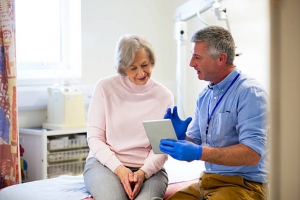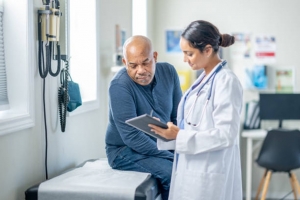GP-Led Care Scheme to Ease Hospital Pressure Expanded Across England
A national initiative aimed at supporting GPs to deliver more care locally and reduce NHS hospital waiting times is being expanded, the government has announced. With £80 million in funding, the scheme aims to support up to two million patients by the end of the 2025/26 financial year.
The ‘Advice and Guidance’ system enables GPs to consult with hospital specialists directly before referring patients, helping to manage conditions such as menopause, IBS, and ear problems more efficiently in the community. The approach is designed to offer quicker care, minimise unnecessary hospital appointments, and ease pressure on stretched NHS services.
Between July and December 2024, the scheme reportedly diverted over 660,000 cases away from hospitals. Common examples include patients needing earwax removal or hormone therapy advice, who can now be supported in local hubs rather than waiting for hospital referrals. GP surgeries can claim £20 per case, which may include multiple consultations with specialists.
Health Minister Karin Smyth described the scheme as part of a broader effort to “rewire the NHS” and improve access to timely treatment. Meanwhile, health bodies welcomed the move but stressed the need for clear patient communication and long-term investment in primary care to truly restore and protect the role of the family GP.
Nations Unite on Landmark WHO Pandemic Treaty
Member states of the World Health Organization have reached a consensus on a groundbreaking treaty aimed at improving global coordination during future pandemics. The legally binding agreement follows years of negotiation and is intended to prevent the confusion and competition seen during the Covid-19 crisis.
Central to the deal is the swift sharing of disease-related information, allowing scientists and pharmaceutical firms to act quickly in developing vaccines and treatments. For the first time, the WHO will also have oversight of international supply chains for essential protective gear like face masks and medical gowns, helping to avoid shortages in times of need.
Described by WHO director-general Dr Tedros Adhanom Ghebreyesus as a "milestone" for global health, the agreement reflects a renewed sense of international cooperation. He praised the collective effort, calling it proof that nations can still unite to face shared global threats.
Under the treaty, pharmaceutical companies will be required to allocate 10% of pandemic-related products to the WHO, with another 10% offered at fair prices. The pact also encourages the sharing of medical technologies with developing nations, although this has stirred debate between wealthier countries and those with fewer resources. A proposed system for pathogen and benefit sharing will allow quicker access to critical data, helping to fast-track global responses in future health emergencies.
New Targeted Breast Cancer Drug Approved for NHS Use
Women with advanced breast cancer in England could soon benefit from a newly approved targeted treatment on the NHS. The National Institute for Health and Care Excellence (NICE) has recommended the use of capivasertib, a tablet taken alongside fulvestrant, for patients whose hormone receptor-positive, HER2-negative breast cancer has continued to grow after hormone therapy.
This new combination is the latest in a growing range of personalised cancer treatments available on the NHS. Clinical trials showed that patients taking capivasertib with fulvestrant experienced, on average, an additional four months before their disease worsened, compared to those receiving fulvestrant alone.
Professor Peter Johnson, National Clinical Director for Cancer at NHS England, said the treatment could make a real difference for those whose cancer has progressed despite previous therapies. “Although it won’t be the right option for everyone, extending the time before more aggressive treatments are needed can help maintain quality of life and support our goal to personalise care,” he explained.
The decision offers fresh hope for eligible patients, providing a less invasive option that may delay the need for more intensive treatment. The approval reflects ongoing efforts to expand and tailor cancer care, aiming to give patients both more time and greater choice.
NHS Faces Winter Strain as Seasonal Viruses Fill Nearly 600,000 Beds
The NHS experienced intense pressure this winter as almost 600,000 hospital beds were occupied by patients suffering from COVID-19, flu, RSV, and norovirus - exceeding the population of Malta. Between 25 November 2024 and 30 March 2025, hospitals across England faced what has been described as a ‘quad-demic’, with multiple viruses placing strain on services.
In the final winter update from the NHS, COVID-19 cases in hospitals reached their highest point this year, with 1,174 patients admitted last week – a rise of nearly 12% from the previous week and the most recorded since December. This increase coincides with the launch of the spring COVID vaccination campaign, targeting 7.5 million people at higher risk, including older adults, care home residents, and those with weakened immune systems.
Hospitals continue to face capacity issues, with adult bed occupancy at 94.1% and an average of over 90,000 adult inpatients per day. Additionally, more than 1.6 million hospital bed days were lost due to patients who were medically ready for discharge but remained in hospital.
Despite continued high demand, ambulance handover delays improved, with time lost down 13% compared to last year. NHS leaders and the government have praised staff for their dedication and are pushing forward plans to improve urgent and emergency care before next winter.
Carers Gain Extra Support as Benefits and Work Allowances Increase
Carers across the UK can now work more hours without losing their Carer’s Allowance, thanks to new benefit changes rolled out alongside the latest state pension and benefit increases. While most benefits have risen by 1.7% - matching last September’s inflation rate - carers are also being granted greater earning flexibility.
Previously, those claiming Carer’s Allowance were limited to earning £151 a week, but the new threshold has increased to £196, allowing more part-time work without affecting entitlements. The weekly allowance itself has also gone up, now standing at £83.30. The Department for Work and Pensions expects around 60,000 more carers will qualify for the benefit by 2029.
The update has been welcomed by carers like Stephanie Swann from Stockport, who looks after her six-year-old son Joseph, who has cerebral palsy. “It’s a step in the right direction,” she said. “Even a few extra hours of work helps with routine and self-worth, though caring for Joe is effectively a full-time job.”
These benefit increases come shortly after price hikes in water, energy, and council tax bills. Meanwhile, a new right to up to 12 weeks of paid neonatal leave has also come into effect, giving additional support to families with babies in neonatal care - offered on top of maternity or paternity entitlements.
Boost in NHS Funding Leads to Faster Cancer Diagnoses and Shorter Waiting Times
The NHS has seen significant improvements in patient care thanks to a record £26 billion investment from the Government in last year’s budget. The funding was aimed at helping the health service bounce back from the pressures of the pandemic, with a particular focus on reducing waiting times and expanding hospital capacity. Health Secretary Wes Streeting confirmed the investment is already making a difference, saying, “Our tough choices at the Budget are paying off – patients are being seen faster, and lives are being saved as a result.”
One of the key changes has been the increase in out-of-hours appointments, which has resulted in 76.1% of cancer patients receiving a diagnosis or being given the all-clear within 28 days between July 2024 and January 2025. This marks an improvement from 71.8% during the same period the previous year. Faster diagnosis is closely linked to better outcomes for cancer patients, helping ensure that treatment can begin sooner and with better chances of success.
Mr Streeting, who is a cancer survivor himself, acknowledged the importance of timely diagnosis, stating, “We are determined to cut waiting times and reform the NHS so that it delivers for everyone.” In just six months, an additional 80,000 patients have been diagnosed or cleared of cancer, with overall NHS waiting lists reduced by 193,000. The Plan for Change continues to focus on efficiency, accessibility, and delivering better outcomes across all areas of care.
The government also met its target of two million extra appointments - covering chemotherapy, radiotherapy, diagnostic testing, and more - seven months ahead of schedule. Healthcare leaders from Cancer Research UK and Macmillan Cancer Support welcomed the progress and emphasised the importance of developing the new National Cancer Plan to build on these results.
Morning-After Pill to Be Free at Pharmacies Across England
Women in England will soon be able to access the morning-after pill free of charge at local pharmacies, as part of a new government initiative set to roll out later this year. While the medication is already available without cost through most GPs and sexual health clinics, pharmacy access has remained inconsistent - varying depending on local council funding, with some women paying up to £30.
The government hopes this change will eliminate these regional disparities and ease pressure on GP services. Emergency contraception is most effective when taken as soon as possible after unprotected sex, but access has often depended on where a woman lives. By extending NHS coverage to pharmacies, ministers aim to ensure quicker, more equitable access to this essential treatment.
Health minister Stephen Kinnock described the move as a step towards a fairer healthcare system, highlighting how many women currently face an “unjust postcode lottery” when trying to access emergency contraception. He said the plan would help guarantee timely support for all, regardless of location or income.
Pharmacy leaders welcomed the decision, calling it a win for both patients and the wider pharmacy network. However, they stressed the importance of proper NHS reimbursement to cover the cost of consultations required before the medication can be dispensed, ensuring pharmacies aren’t left out of pocket.
Pharmacies Pause Protests as Government Unveils New Funding Deal
Community pharmacies across England have welcomed a new government funding agreement, prompting some to postpone planned protest actions. The deal, aimed at addressing longstanding financial pressures, includes a rise in funding from £2.7bn this year to £3.1bn in 2025/26, along with additional support services such as mental health consultations, blood pressure checks, and free access to the morning-after pill.
In light of the announcement, the National Pharmacy Association (NPA), which represents thousands of pharmacies, has delayed protest plans that were due to begin this week. These included reduced opening hours and potential weekend closures. While describing the package as a "step forward", the NPA highlighted that it still falls short of the funding levels needed to fully sustain the sector.
Pharmacies have faced mounting pressures from rising workloads, stagnant funding, and increasing costs - including higher employer National Insurance contributions. The sector has long warned of looming closures, with many describing the situation as "critical" and unsustainable without urgent intervention.
As part of the package, the government will also write off £193 million in pharmacy sector debt. While the move has been cautiously welcomed, industry leaders stress that more comprehensive reform is needed. The Independent Pharmacies Association said the deal is welcome but "will not stop closures", citing persistent underfunding and rising overheads.










